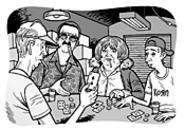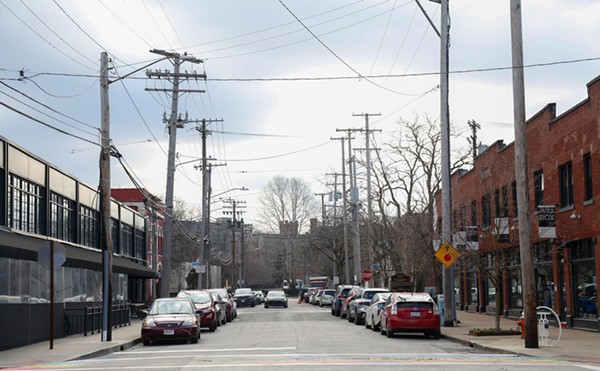If this is a casino, it might be the ugliest one on earth: The walls are bare, the chandeliers look plastic, and the floor is naked concrete. On most days, it serves as a West Side fraternal hall. But no one is complaining about the accommodations.
On this Friday night, roughly 200 people fill folding chairs around the poker tables and lean over blackjack games. It's the usual casino blend: The guy with the requisite crushed-velvet jogging suit, gold chain, and Sammy the Bull hair. The paunchy middle manager with the look of money lost. The old lady with thick glasses, who tugs nervously at her Christmas sweater.
There is no beer or liquor, and the one free meal was served early in the evening. Many are smoking, and the diehards pound coffee. Instant bingo tickets blanket the floor like snow. There is no music, and the gamblers are silent as a church congregation, communicating with their hands. But since the closest real casinos are in Detroit and Niagara Falls, this will have to do.
In November, the Ohio legislature made a futile, 11th-hour push to legalize video slots and card games at horse tracks, effectively turning them into casinos. To some state reps, it might have been a quick fix for a slumping budget. The buses that roll west to Windsor each day testify to the dollars moving beyond state borders. Why not keep that money here?
Yet conservatives were able to sabotage the bill, trumpeting it as a morality victory over profit-driven depravity. What no one seemed to acknowledge is that the games would go on in Ohio -- the legislature just won't be taking a cut.
On any given night, one or more casinos -- nonprofit and otherwise -- operate in rented halls somewhere in Cleveland. What they lack in flair, these makeshift casinos make up for in familiarity. "You see all the same dealers, all the same faces," says one gambler. "It's this whole underground gambling circuit."
At one event, the organizer looks over the Sunday-night crowd, which is smaller on this, his fourth day of card-playing. "There are maybe 100 people here, and of those, I probably know 99," he says.
The man leases the chips, cards, and tables to a charity group. He also effectively runs the event. He claims his dealers are not even paid. "You have people that just like to be around the action," he says.
State law allows a nonprofit organization to hold two gambling fund-raisers per year. The man operating this event says that, on a good weekend, a nonprofit can make $35,000. Churches, community centers, neighborhood groups, schools, and a foundation for terminally ill children are some of the causes he's championed. During the course of a year, he claims, he has raised $750,000.
He takes no profit for himself, he says, which leads to a natural question: Why would he spend most of his weekends supervising games? "I enjoy the people, and I like the atmosphere," he shrugs.
Given that the games last till 8 a.m. and stretch over four-day weekends -- with enough secondhand smoke to prompt EPA warnings -- it seems odd that "atmosphere" would be a plus. Odd, too, that while he claims to be one of the few reputable operators in town, a panicky look comes over his face when a reporter introduces himself.
Truth is, it's nearly impossible to separate the real charity organizers from those whose games only claim to benefit nonprofits. Talk to people in the business, and they'll tell you there's far more in it for the personal score than to aid widows and orphans. After all, the charitable gambling law is one step better than legalized casinos -- at least from the organizer's perspective. It offers all the profit, but only a fraction of the oversight.
In August, 66 people, including Reverend Sam Shoaff of Cleveland Heights, were indicted for allegedly pocketing the profits of instant-bingo tickets and slot machines. More than 600 police officers raided homes and stores in six counties. That same month, Sam Georgakopolous of Akron pleaded guilty to taking home most of the $1 million he made on gambling fund-raisers. Roughly $1.6 million disappeared from Eastlake North High bingo games, a case that brought jail time for three of its organizers, including an assistant principal. There are many more busts too small to make the news.
"It's not that big of a deal," says one gambler, who has been present during police raids. "They just cash you out, and you go home."
It comes down to personal responsibility, says one organizer. He keeps close watch on his dealers -- just the week before, he caught one showing cards to players, another taking cash for himself. "You have that problem everywhere," he says. He maintains spreadsheets documenting his cash flow. When the event is over, the man says, all the money goes to the nonprofit. "No charity that I've ever worked for has accused me of cheating them," he says.
Even so, he has caught some nonprofits skimming cash before adding the proceeds to their general funds. Other operators phone police with charges of impropriety to sabotage competitors' games.
When two cops stride into one game, few players even look up from their cards. "Are you going to arrest me?" a woman asks a young officer, as she offers him her wrists. "Only if you have the handcuffs," he answers with a wink.
Other games are more intimate, convened in homes and apartments, and closed to new faces. If too many strangers are allowed to play, one will inevitably be a vice cop or a sore loser turned informant. Others games are held in shuttered bars, with access granted only to those who possess the speakeasy code. And slot players can find machines in barren strip malls.
"If you want to play it," says one gambler, "you can find it."
Which means that, when the legislature renews its debate, it won't be deciding whether to authorize casinos or not. It will merely be deciding whether the government wants to take a cut.













